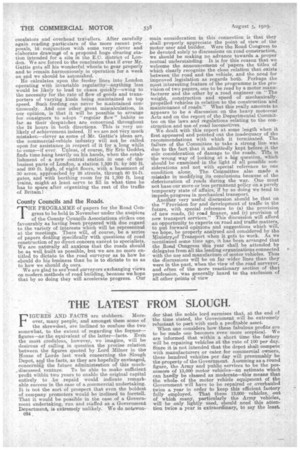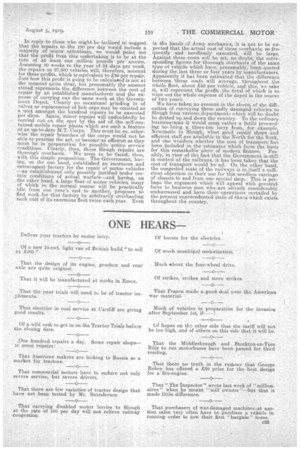THE LATEST FROM SLOUGH.
Page 2

Page 3

If you've noticed an error in this article please click here to report it so we can fix it.
FIGURES AND FACTS are stubborn. Moreover, many people, and amongst them some of the shrewdest, are inclined to confuse the two somewhat, to the extent of. the foemerfigures---as-the equivalent of the latter—facts. Even the most credulous, however, we imagine, will be desirous of calling in question the precise relation between the figures quoted by Lord Milner in the House of Lords last week concerning the Slough Depot, and the facts, as they are hopefully envisaged, concerning the future administration of this much-discussed venture. To be able to make sufficient profit within two years to enable the original capital entirely to -be repaid would indicate remarkable success in the case of a commercial undertaking. It is not the sort of prospect that even the boldest of company promoters would be inclined to foretell. That it would be possible in the case of a Government Undertaking, run and staffed as, a Government Department, is extremely unlikely. We do notowon
024
der that the noble lord surmises that, at the end of the time stated, the Government will be extremely reluctant to part with such a profitable asset. When one considers how these fabulous profits are to be made one becomes even more sceptical. We are informed that within a short time the factory will be repairing vehicles at the rate of 100 per day. Since it is not intended that the depot shall compete with manufacturers or cater for commercial owners, these hundred vehicles per day will presumably be the property of the Government. Assuming as a. round figure, the Army and public services to be the possessors of 13,000 motor vehicles—an estimate which can hardly be classed as moderate—this means that tho whole of the motor vehicle equipment of the Government will have to be repaired or overhauled twice a year in order to keep this efficient factory fully employed. That these 13,000 vehicles, out of which many, particularly the Army vehicles, will be only lightly used, should need this attention twice a year is extraordinary, to say the least. In reply to those who might be inclined to suggest that the repairs to the 100 per day would include a majority of minor attentions, we would point Cut that the profit from this undertaking is to be at the rate of at least one million pounds per annum. Assuming 50 weeks to the year of 511 days per week, the repairs on 27,500 vehicles will, therefore, account for these profits, which is equivalent to £39 per repair. Just how this profit is going to be ealculaked is not at the moment quite clear, but presumably the amount stated represents the difference between the cost of repair by an established manufacturer and the expense of carrying out the same work at the Government Depot. Clearly no occasional grinding in of valves or replacement of hub caps may be counted as a unit amongst the hundred retiaira to be executed per diem. Again, minor repairs will undoubtedly be carried out on the spot by. th& aid of the self-contained mobile repair plants which are such a 'feature of an up-to-date KT. Corps: This must he so, otherwise the repair branchesof the corps would not be able to practise the art, or, become-a.s efficient as they must be in preparation for possible active service conditions. Clearly, then, these Slough repairs are thorough overhauls. We seem to be faced, then, with this simple proposition. The Government, having, on the one hand, established an enormous and extravagant factory for the repair of motor vehicles —an establishment only possibly justified under certain conditions of actual warfare-sand having, on the other hand, a large fleet of motor vehicles, many of which in the normal course will be practically idle from one year's end to another, proposes to find work for that factory by arbitrarily overhauling each unit of its enormous fleet twice each year. Even in the hands of Army mechanics, it is not to be expected that the actual cost of these overhauls, so frequently and needlesslyexecuted, will •be large. Against these-costs will be set, no doubt, the corresponding figures for thorough overhauls of the same type of vehicle which have, presumably, been.quoted during the last three or four years by manufacturers. Apparently it has been estimated that the difference between 'these costs will average, throughout the whole fleet, about £40 per vehicle, ansl this, we take • it, will represent the profit, the total of which is to wipe out the whole expense of the depot in the course of two years. We have taken no account in the above of the difficulties of conveying these sadly damaged vehicles to Slough from various_departmenta which will tio doubt be dotted up and down the country. To the ordinary businessman it would seem .rather a futile proceed.ing tot, bring a three-ton lorry from, for example. Neweastle to Slough, when good repair shops and efficient staff are available in the North for the -ork, and one wonders whether the cost of transPort has been included in the estimates which form the basis for this remarkable piece of modern finance. Possibly, in view of the fact that the Government instill in control of the railways, it has been taken that the cost of transport would benil. On the other hand, the congested state of the railways is in,iteelf a sufficient objection to their use for this needless carriage of clams to and from one special shop. This is perhaps the argument -which will appeal with greatest force to business men who.are already considerably embarrassed and have theiroperatiens curtailed by the. present unprecedented State of chaos which exists throughout the country.






















